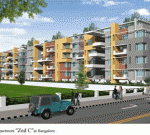NEW DELHI: The Income Tax Department became one of the largest purchasers of real estate properties last year as it embarked on a mega expansion fling to spread its establishment for enhancing taxpayer services in the country.
The department, which has recently started a special drive to check frequency of black money in the country’s real estate sector, has acquired high-worth properties worth about 2,500 crore in more than 20 cities in the last year alone.
The largest possession by the department has been at the cost of more than 2,000 crore for the purchase of office space in the civic centre near the national capital’s marketing hub, Connaught Place. The civic centre is the tallest building in Delhi. The department has likewise purchased 56 staff quarters worth more than 89 crore at the pricey Bandra-Kurla complex in Mumbai.
“All the purchases have been done in order to inflate taxpayer facilities and to provide better living and working facilities for the department staff. No doubt the department’s purchasing power has been the largest in the last financial year.” The department, with these possessions in the real estate sector has probably become the largest government department to acquire and create real estate in the country, the Income Tax commissioner said.
The shopping bucket of the department, has other high-profile acquires and possessions like creation of a training centre and hostel facilities for new comers of the Indian Revenue Service (IRS) at their alma mater – National Academy of Direct
Taxes (NADT) in Nagpur at the cost of Rupees100 crore.
In Chandigarh, the I-T department has purchased 5,000 acres of land for office space at the cost of more than Rupees 33 crore, a centralized air conditioned I-T office at Udaipur at the cost of more than Rupees 16 crore, acquisition of land for creation of office building for the department in Mumbai at about Rupees 23 crore and land measuring more than 9,500 sq m at Jamnagar, Gujarat for office building at Rupees 8 crore.
Another set includes office building at Siliguri for 5.5 crore and a separate creation of 49 residential sectors and guest houses at Siliguri in excess of 10 crore. One more big acquirement by the department has been made at Muzzafarpur in Bihar for building staff quarters at the cost of more than 21 crore.
The department has also been sustained by the success of direct taxes (income tax) collection which was about 4.50 lakh crore in the financial year 2010-11. Despite the department paying 72,000 crore in refunds, the stout direct tax collection is the highest in any financial year.
 Puravankara Projects Ltd.
Puravankara Projects Ltd. NEW DELHI
NEW DELHI
